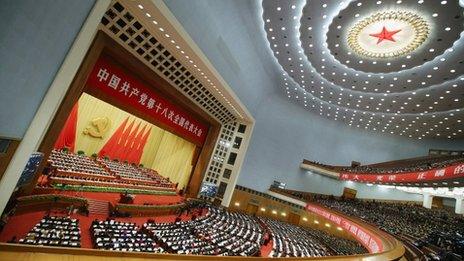Power, corruption and the Communists
- Published

Party delegates were warned about corruption at the five-yearly Congress
From the outside, the hold the Communist Party has on China looks as solid as a rock. It wields absolute power over China's 1.3 billion people.
But after six decades there are fears that the party is corroding from the inside, its ranks riddled with corruption.
On Friday, delegates from different provinces met in the Great Hall of the People, a day after their General Secretary Hu Jintao warned that corruption could lead to the fall of the party.
Mr Hu and Premier Wen Jiabao have delivered similar warnings before, so some dismiss this as hollow talk. But there is a feeling that corruption is undermining the party's legitimacy in the eyes of ordinary people.
At his provincial delegation's meeting on Friday, Yuan Chunqing, party secretary for Shanxi Province, told me that fighting corruption has in recent years had been an important task.
Reports say Wen Jiabao's family amassed a huge fortune
"We've now elevated it to a life-or-death issue for the party. But we believe we can control it, and people will support us because of the Communist Party's model behaviour," he said.
To encourage model behaviour, Shanxi's Communist bosses say they have been spying on party members using webcams, and demanding officials to study more Marxism-Leninism. It will make people more virtuous, they say.
What has pushed the issue to the fore at this congress has been the downfall of Bo Xilai.
Not so long ago a contender for the party's new leadership, he is now under arrest awaiting trial and accused of massive corruption. His alleged crimes were exposed after his wife admitted killing British businessman Neil Heywood.
In China today it is harder for the party to hide abuses of power. In the 10 years that the outgoing leaders have been in power, the number of internet users in China has grown tenfold to more than 500 million.
The internet is giving people a tool to both scrutinise the party and vent their anger about corruption.
Li Xinde runs an anti-corruption website. His site has to be hosted on servers outside China, but he has exposed and brought down many corrupt party members.
He showed me video of a demonstration against land-grabbing officials which he posted on his site recently. Police are seen dragging protesters away and kicking them.
"It used to be that individuals were corrupt. Now it's whole groups of officials," says Mr Li.
"The system is crippled. Nobody's accountable. If we don't find ways to mend it, the problem will only become more serious."
The next generation of leaders face the task of tackling corruption
Most damaging of all for the Communist Party have been recent reports about the extraordinary wealth amassed by the relatives of party leaders, even though there was no suggestion of corruption in those cases.
Relatives of Xi Jinping, who is about to take over as the party's new leader, were estimated by Bloomberg News, in June, to have more than $370m (ÂĢ230m) of assets.
While the New York Times that the extended family of Wen Jiabao had over $2.5bn of assets under their control.
Both news organisations have since had all access to their websites blocked in China.
Lawyers for Mr Wen's family issued a statement denying any wrongdoing, calling the New York Times' story "untrue".
Roderick MacFarquhar, professor of government at Harvard University, says the wealth may have been acquired legitimately, but it is embarrassing for the party.
"As Hu Jintao and other leaders before him said, you cannot have the country run by massive kleptocracy, because one day people will get tired of this," he said.
"The urban bourgeoisie turned away from Chiang Kai-shek and the Nationalists because their regime was so corrupt. The Communist Party simply cannot afford for that to happen."
But while the party worries that corruption could be fatal, it may also be unable to stop it. It is not clear whether a party that is unwilling to submit to any outside control can clean itself up.